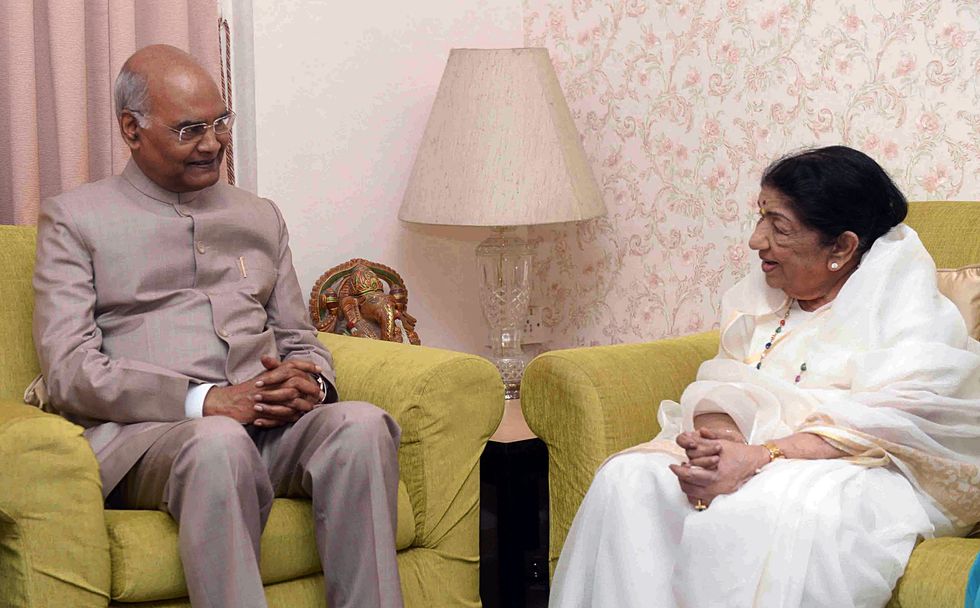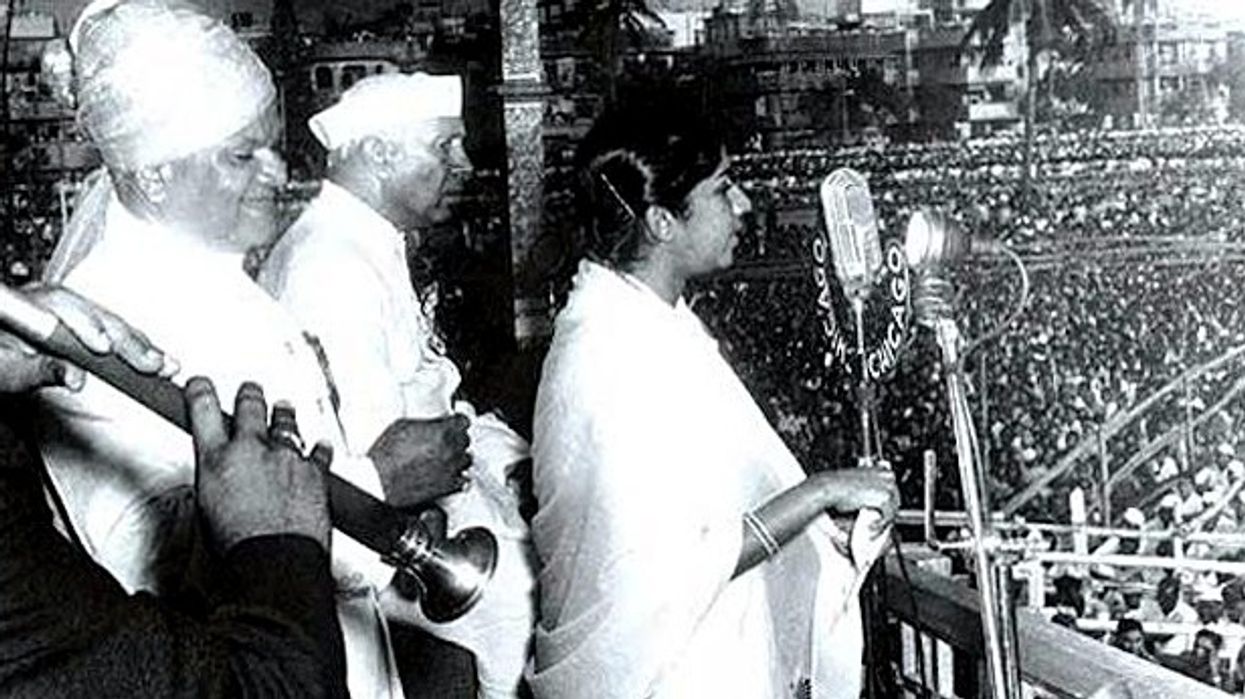Khuda Nigahaban Ho Tumhara, Dhadkte Dil Ka Salaam Le Lo/
Tumhari Duniya Se Jaa Rahe Hai, Utho Hamara Salaam Le Lo
THESE immortal lines penned by Shakeel Badayuni and composed by Naushad from the final scenes of the film Mughal-e-Azam were sung by Lata Mangeshkar through the character of Anarkali (played by actress Madhubala), leaving a drugged Salim (played by Dilip Kumar).
They are most apt as news broke of Lata’s passing. The Indian government did not confer the Bharat Ratna on Dilip Kumar for obvious reasons. But they did on Lata. The time sadly has come to do what she urged in that song – get up and salute her goodbye.
For me, she is the only person among all Indians – political leaders and military heroes notwithstanding – who is deserving of the title of Bharat Ratna.
Who else has given us undiluted pleasure with songs that have filled our lives (at least my life) for 75 years as we have heard, recalled and in our own creaking voices sung them when alone or in groups, when sad or happy?
Who else has given such constant company to us, free of any demand, for all our lives? Who has lived modestly, without ego or tantrums, and delivered service to her profession, her industry, to music and to India on a comparable scale?
The Hindi film industry (known as Bollywood) is probably the best-known global industry of India. Not just the diaspora, but all of south and southeast Asia, a lot of black Africa and the Caribbean enjoys its music (I once had a Tunisian taxi driver in New York singing his version of Hindi film songs).
Raj Kapoor took Awara to the world of communism and made the Russians sing Awara Hoon (the title song). Such films are meant for people within and beyond India who may not grasp Hindi, but who can still be entertained. It is cinema at its most innovative and most communicative.
In the Hindi film industry, Lata was, without doubt, the central figure for more than 70 years. I recall her songs in the mid-1940s when I was five or six.

She began singing then in her early teens as the only financial support for her family. There were the great gharana singers – Zohrabai Ambalewali, Amirbai Karnataki, the nightingale Noor Jahan, Suraiya, Shamshad Begum – who were popular at the time. When a 13-year-old girl from the arathi/Konkani Goan community (there is a Mangeshkar family temple in Goa) began to sing, few could imagine that within 10 years she would surpass them all.
In the early days, you could hear the dismissive ways in which the grown-ups talked of her. Her voice was too thin, too shrill. Her Urdu accent was laughable. Listen to her early hit Sajan Ki Galiyan Chhod Chale (film Bazaar, music by Shyam Sundar) and you hear a halting voice, each word spelt out slowly, but yet sweetly.
The duet Haay Mohabbat Unse Milane Ka Bahana Ban Gaya (with Mohammed Rafi) in the same film became a hit. That was 1945. By 1948, in Mehboob Khan’s classic film Andaz, you can hear faultless Urdu diction in Tod Diya Dil Mera or Uthaye Ja Unke Sitam. This was due to Naushad taking her by the hand and telling her what he required of her.
From then on, Lata was the lead playback singer for the next 30 years at the very least.
Naushad quickly dropped Shamshad Begum after Mela and went on with Lata to make Babul, Aan, Deedar, Amar, Baiju Bawra, Ganga Jamuna, Shabab and many more films.
When Shankar Jaikishan emerged in the late 1940s with Barsaat, Lata sang every song for the lead actresses – from Nimmi to Nargis – as well as the first song Hawa Me Udra Jaaye sung by a minor actress. Barsaat was a mega hit with Barsaat Mein, Mujhe Kisise Pyaar Hogaya, Bicchade Hue Pardesi plus the duet with Mukesh, Chhod Gaye Baalam.
During her career, Lata sang for every music director (except famously for OP Nayyar, who stuck to Asha Bhosle, Geeta Dutt and Shamshad Begum).
Madan Mohan composed his best songs for Lata, including the three unforgettable ghazals in Adalat and the haunting Lag Jaa Gale from Woh Kaun Thi.
C Ramchandra composed Dheere Se Aaja Ri Akhiyan Me Nindiya, sung by Lata. It is a lullaby to which many of us have fallen asleep as children.
Lata gave her best to every music director she worked for. She often produced a special voice for each of them and also for each heroine she was singing for. Her Rasik Balama from Chori Chori (Shankar Jaikishan) for Nargis is different from Kaanto Se Khinch Ke Ye Aanchal from Guide (SD Burman) for Waheeda Rahman, but as immensely popular. They are complex melodies.
She was versatile – be it a solo, duet or chorus (Aaj Mere Man Me from Aan), night club or cabaret songs, or mujra (Pakeezah), she sang them all to perfection.
But above all, you were struck by her simplicity, her modesty and devotion to her family. One unforgettable song is her rendering of Pradipji’s Aye Mere Watan Ke Logo. India’s prime minister Pandit Jawaharlal Nehru was seen tearing up on that occasion. Lata was singing for us all and for the nation.
It is no effort to say ‘Lata Mangeshkar amar raho’ (she will be immortal). She has guaranteed that herself. As she sang in the film Anarkali (filmed on actress Bina Rai in the title role, music by C Ramchandra) as the heroine was being entombed, Isse Mazaar Mat Kaho, Yeh Mahal Hai Pyaar Ka (Don’t call this a mausoleum, it is a palace for love).
She has built a monument of love which will last a long time.




